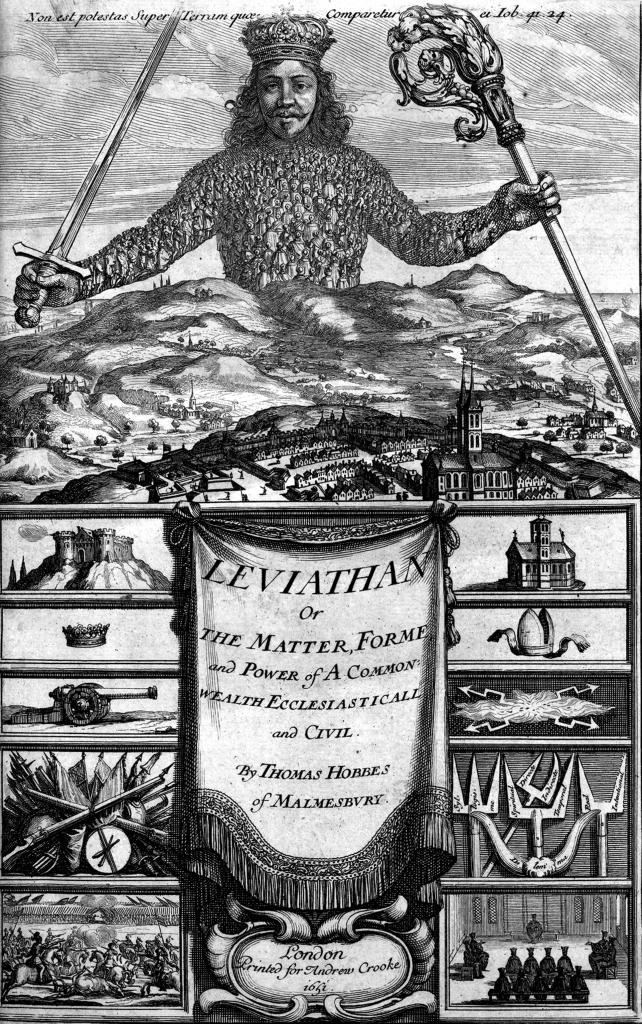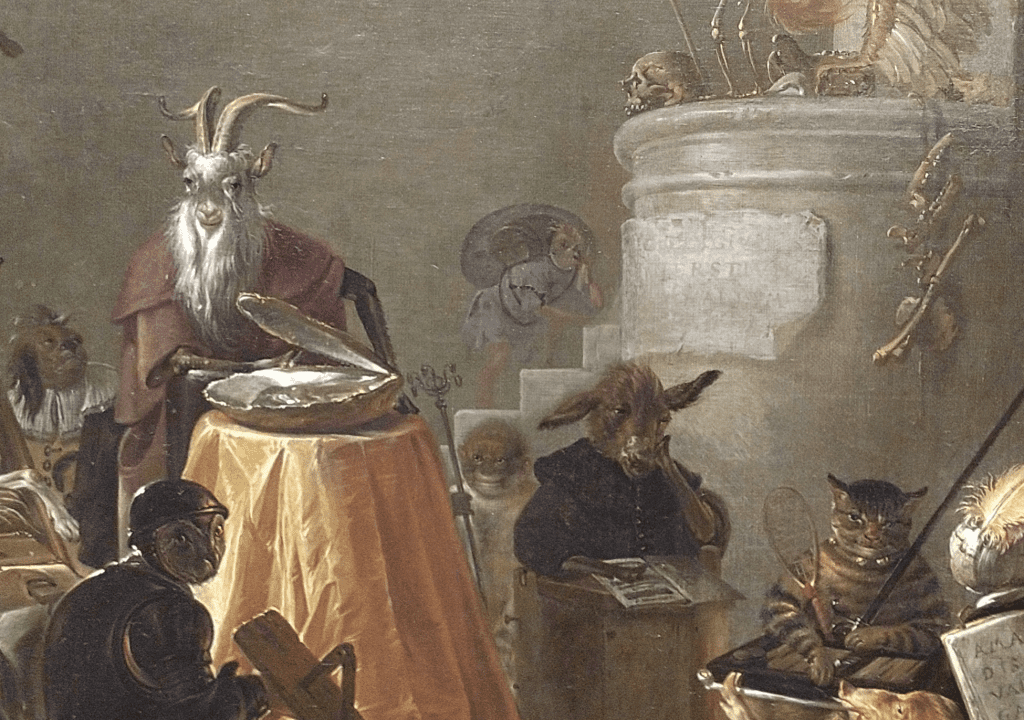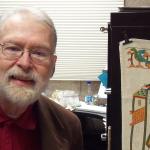“What are you laughing so much about?” asked my wife in puzzlement.
“I’m reading Thomas Hobbes,” I replied.
“Thomas Hobbes? The one who talked about life being nasty, brutish and short?” she continued.
“Yes, him. Seventeenth century.”
“Um, OK. And he’s funny?”
“He’s making me think of Terry Pratchett.”
I need to explain to her, and to you. Thomas Hobbes was one of England’s greatest political thinkers, and a founder of the idea of contract theory. He is best known for his book Leviathan, published in 1651, which portrayed the horrors of life in a state of nature, without government, when “the life of man [was] solitary, poor, nasty, brutish, and short.” To free themselves of such anarchy, people built states, and Hobbes argued for a state ruled by an absolute sovereign.
Hobbes believed that this sovereign should not be checked by established churches, and indeed denied that churches were intended to possess any worldly power at all. The kingdom of God was absolutely not of this world. This was a fundamental error in Christian history from early times. In fact, said Hobbes, so many of the abuses that he associated with Christianity could be blamed on the improper assimilation of ideas and practices from Greek paganism and Roman imperial power. As he famously declared, in a much-quoted phrase, “the Papacy, is no other, than the Ghost of the deceased Roman Empire, sitting crowned upon the grave thereof: For so did the Papacy start up on a Sudden out of the Ruins of that Heathen Power.”
That is as I say an oft quoted line. I have applied the same idea to the modern Catholic Christianity of much of the Global South, where the great churches of Brazil, Mexico, the Philippines and other teeming nations are in a sense the ghosts of the old Iberian empires of the sixteenth and seventeenth centuries.
However much they relish that “ghosts” quote, very few readers go on to quote the sequel, which is what I was finding uproarious. Maybe it is just me, but I found very funny Hobbes’s proof that the hierarchical institutional church is actually a direct parallel to the Kingdom of the Fairies. And I should explain, Hobbes is apparently going after the Catholic church and the Papacy, but in almost every line, he is also making digs at any and all established state churches, including Lutherans and Anglicans. “Priests” came in many denominational colors. Hobbes was skirting censorship throughout his writing, and did not need to offer a direct challenge to his own Anglican masters.
To understand his idea of the “fairy kingdom” we should recall that he was born in 1588, when the old popular beliefs about the alternative spiritual universe still flourished, with quite an elaborate mythological system. This was exactly the vernacular world in which Shakespeare had grown up, and portrayed in his Midsummer Night’s Dream, written around 1598. Here, anyway, is how Hobbes conclusively proved that hierarchical, institutional, churches are in fact copied directly from the kingdom of the fairies. Only when we understand that ghostly and fairy context can we put that famous “ghost of the Roman Empire” quote in its proper context, which is a very clever extended satire:
For, from the time that the Bishop of Rome had gotten to be acknowledged for Bishop Universall, by pretence of Succession to St. Peter, their whole Hierarchy, or Kingdome of Darknesse, may be compared not unfitly to the Kingdome of Fairies; that is, to the old wives Fables in England, concerning Ghosts and Spirits, and the feats they play in the night. And if a man consider the originall of this great Ecclesiasticall Dominion, he will easily perceive, that the Papacy, is no other, than the Ghost of the deceased Romane Empire, sitting crowned upon the grave thereof: For so did the Papacy start up on a Sudden out of the Ruines of that Heathen Power.
The Language also, which they use, both in the Churches, and in their Publique Acts, being Latine, which is not commonly used by any Nation now in the world, what is it but the Ghost of the Old Romane Language.
The Fairies in what Nation soever they converse, have but one Universall King, which some Poets of ours call King Oberon; but the Scripture calls Beelzebub, Prince of Daemons. The Ecclesiastiques likewise, in whose Dominions soever they be found, acknowledge but one Universall King, the Pope.
The Ecclesiastiques are Spirituall men, and Ghostly Fathers. The Fairies are Spirits, and Ghosts. Fairies and Ghosts inhabite Darknesse, Solitudes, and Graves. The Ecclesiastiques walke in Obscurity of Doctrine, in Monasteries, Churches, and Churchyards.
The Ecclesiastiques have their Cathedral Churches; which, in what Towne soever they be erected, by vertue of Holy Water, and certain Charmes called Exorcismes, have the power to make those Townes, cities, that is to say, Seats of Empire. The Fairies also have their enchanted Castles, and certain Gigantique Ghosts, that domineer over the Regions round about them.
The fairies are not to be seized on; and brought to answer for the hurt they do. So also the Ecclesiastiques vanish away from the Tribunals of Civill Justice.
The Ecclesiastiques take from young men, the use of Reason, by certain Charms compounded of Metaphysiques, and Miracles, and Traditions, and Abused Scripture, whereby they are good for nothing else, but to execute what they command them. The Fairies likewise are said to take young Children out of their Cradles, and to change them into Naturall Fools, which Common people do therefore call Elves, and are apt to mischief.
In what Shop, or Operatory the Fairies make their Enchantment, the old Wives have not determined. But the Operatories of the Clergy, are well enough known to be the Universities, that received their Discipline from Authority Pontificall.
When the Fairies are displeased with any body, they are said to send their Elves, to pinch them. The Ecclesiastiques, when they are displeased with any Civill State, make also their Elves, that is, Superstitious, Enchanted Subjects, to pinch their Princes, by preaching Sedition; or one Prince enchanted with promises, to pinch another.
The Fairies marry not; but there be amongst them Incubi, that have copulation with flesh and bloud. The Priests also marry not.
The Ecclesiastiques take the Cream of the Land, by Donations of ignorant men, that stand in awe of them, and by Tythes: So also it is in the Fable of Fairies, that they enter into the Dairies, and Feast upon the Cream, which they skim from the Milk.
What kind of Money is currant in the Kingdome of Fairies, is not recorded in the Story. But the Ecclesiastiques in their Receipts accept of the same Money that we doe; though when they are to make any Payment, it is in Canonizations, Indulgences, and Masses.
To this, and such like resemblances between the Papacy, and the Kingdome of Fairies, may be added this, that as the Fairies have no existence, but in the Fancies of ignorant people, rising from the Traditions of old Wives, or old Poets: so the Spirituall Power of the Pope (without the bounds of his own Civill Dominion) consisteth onely in the Fear that Seduced people stand in, of their Excommunication; upon hearing of false Miracles, false Traditions, and false Interpretations of the Scripture.
If the Catholic church was made up of ghosts and fairies, then it was easy for Reformation rulers like Henry VIII to remove them by an act of exorcism. But Hobbes is concerned that the Catholics might stage a recovery, on the basis of their global strength, especially if they managed to ally with other churches, such as the Anglicans:
But who knows that this Spirit of Rome, now gone out, and walking by Missions through the dry places of China, Japan, and the Indies, that yeeld him little fruit, may not return, or rather an Assembly of Spirits worse than he, enter, and inhabite this clean swept house, and make the End thereof worse than the beginning? For it is not the Romane Clergy onely, that pretends the Kingdome of God to be of this World, and thereby to have a Power therein, distinct from that of the Civill State.
There is so much here that cries out for commentary. It is endlessly quotable in terms of the evils attributed to churches by anti-clerical activists through the centuries. In terms of the evils of a hierarchical state church, the long passage about fairies and churchmen would appeal to any believers in complete religious liberty, including modern-day Baptists. Hobbes went on to present a radical advocacy of complete religious freedom that was startling for 1651, but which would become standard over the following century or so, as the Enlightenment progressed:
There ought to be no Power over the Consciences of men, but of the Word it selfe, working Faith in every one, not alwayes according to the purpose of them that Plant and Water, but of God himself, that giveth the Increase: and secondly, because it is unreasonable in them, who teach there is such danger in every little Errour, to require of a man endued with Reason of his own, to follow the Reason of any other man, or of the most voices of many other men; Which is little better, then to venture his Salvation at crosse and pile. Nor ought those Teachers to be displeased with this losse of their antient Authority: For there is none should know better then they, that power is preserved by the same Vertues by which it is acquired; that is to say, by Wisdome, Humility, Clearnesse of Doctrine, and sincerity of Conversation; and not by suppression of the Naturall Sciences, and of the Morality of Naturall Reason; nor by obscure Language; nor by Arrogating to themselves more Knowledge than they make appear; nor by Pious Frauds; nor by such other faults, as in the Pastors of Gods Church are not only Faults, but also scandalls, apt to make men stumble one time or other upon the suppression of their Authority.
As I say, there is ample here that cries out for a “Discuss!”
Returning to the fairy analogy, I liked the line abut cathedrals being a modern version of giants’ enchanted castles. But it was the reference to the universities as shops or “operatories” (ie workplaces, or labs) of enchantment, akin to places where the fairies made their magic, that pushed me over the edge into full-scale giggles. “In what Shop, or Operatory the Fairies make their Enchantment, the old Wives have not determined. But the Operatories of the Clergy, are well enough known to be the Universities, that received their Discipline from Authority Pontificall.” Juxtaposing the two, we are pretty much in the world of Terry Pratchett and Unseen University.
Detail of “College of Animals” by Cornelis Saftleven, 1656: photograph is my own work
And that is why Thomas Hobbes, Sage of Malmesbury, had me laughing.















